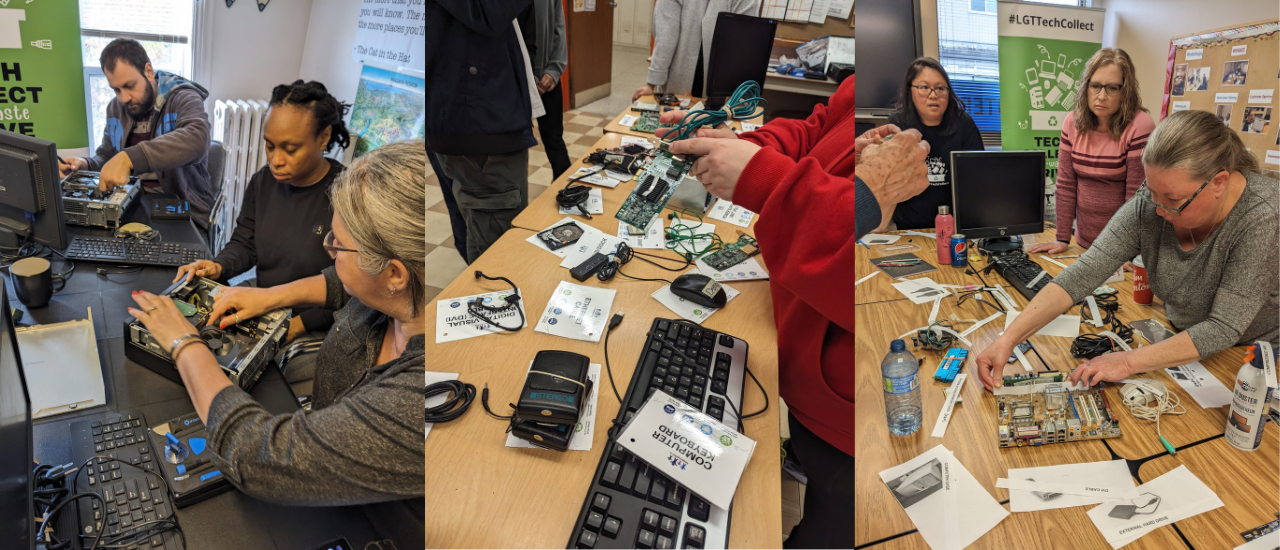30 July 2025
Get Free Tech Help for Your Literacy Program with AlphaPlus Coaching
Take advantage of our customized digital technology support - sign up now.
Announcements

Snapshots from Tech4All workshops at Niagara West Adult Learning Centre, Toronto District School Board and Gateway Centre for Learning.
Can “playing” with technology hardware transform literacy learners into proficient computer users? In a recent AlphaPlus pilot project, three adult literacy programs found out by experimenting with an immersive, hands-on approach to mastering computer basics.
The pilot project first started to take shape when Monika Jankowska-Pacyna, an AlphaPlus team member and technology coach, had an idea and access to special funding. Monika volunteers with Let’s Get Together, an organization that aims to make learning equitable and make education accessible through technology. She approached executive director Alison Canning about bridging the non-profit’s workshops for youth with literacy and basic skills (LBS) programming in Ontario.
Alison was receptive to the idea: “I was interested in seeing if our newly developed computer anatomy workshop could help increase adult literacy learners’ confidence and comfort with technology. I wanted to better understand the gaps and needs in LBS digital literacy learning and modify the lesson to help close the gap.”
With Alison on board, and the AlphaPlus team’s encouragement, Monika reached out to educators already working with digital technology and cell phone support — people she knew to be innovative and open to new ideas. Gateway Centre for Learning in Midland, the Niagara West Adult Learning Centre (NWALC), and the Toronto District School Board (TDSB) agreed to participate in the pilot and host the hands-on workshops.
The group named the pilot Tech4All, reflecting Let’s Get Together’s idea of bringing technology to anyone who needs it to reduce the digital divide. They established the goals of engaging low-level adult literacy learners in hands-on technology and vocabulary lessons, and inspiring instructors and volunteers to make the sessions fun and engaging.
“I saw this pilot as a great way for our learners and our community to learn more about computer anatomy and e-waste. I thought it would be a great project to add to someone’s resumé,” explains Jacky Catterick, executive director at NWALC.
The group met online with Monika facilitating the meetings and connections and the programs sharing their specific needs and hopes. They discussed what types of workshops to offer and decided on computer anatomy and data backup. Let’s Get Together adapted the workshops to meet the needs of local communities and adult literacy classrooms and then delivered them.
From the fall of 2023 until the spring of 2024, each program held four or five workshops. Moving beyond teaching technology skills with handouts and lessons on Word, Excel or PowerPoint, the sessions allowed learners to examine the insides of computers and explore how they work. The sessions also touched on refurbishing computers, data backups, e-waste, online safety, collaboration, lifelong learning and more.
“Computer basics classes usually send learners to books, pictures and websites, but we learned that touching components makes a big difference for adult learners,” Monika says, reflecting on her initial idea shaping into a fruitful pilot project. “The experience was also a success from our perspective at AlphaPlus because we played a part in knowledge-sharing and connecting literacy educators. And now, the door is open between Let’s Get Together and other adult literacy programs.”
“During these workshops, instructors discovered ways to take learners away from paper or screens to make interactions fun, even when working on the basics. Let’s Get Together volunteers were taking out memory cards from computers, and learners would crowd around them and ask questions. Instructors said they’ve never had a workshop with people so engaged,” says Monika. “The participants were inspired, laughing and wanting more. We could see the spark and a shift in confidence; suddenly, the computer wasn’t as scary, and it became easier to teach other computer skills.”
“The pilot was so natural in its rollout. All of the participants enjoyed the experience immensely, often asking, ‘When’s the next time Ali and Monika will be here?’” said Heather, a volunteer instructor at Gateway Centre for Learning.
According to Monika, the pilot revealed that there’s always more to learn and different ways to engage participants. “Initially, we wanted to inspire teachers, but we were surprised by how much confidence these workshops built in learners. In addition, the programs built relationships with other non-profits outside of the adult literacy field, opening up discussions about partnerships and connections in the community.”
Monika, Alison and the leads at each site are now wrapping up the pilot. Gateway plans to offer computer anatomy workshops in the community, and NWALC will host e-waste recycling and digital education events to bring the community to their program. They even applied for and received a Grow Prosper Belong Fund from the Town of Lincoln to support their efforts. Alison plans to expand the reach and scope of Let’s Get Together’s computer anatomy workshop, delivering it in additional languages and encouraging communities to offer it to help people overcome their fears of technology.
For literacy instructors in other programs, this pilot produced a suite of materials that can be used to run similar workshops, including presentations, videos, handouts, activities, tips and links to other helpful resources.
Would you like to set up hands-on computer skills workshops for your adult literacy learners? Visit the Tech4All pilot website to learn more and then contact us to find out how you can run similar workshops in your community.